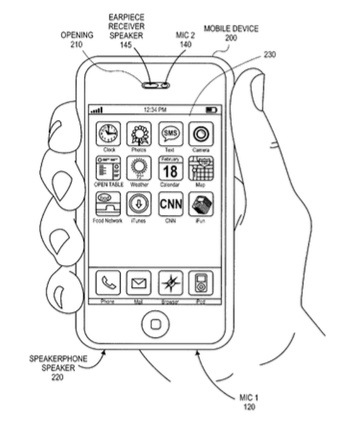Apple has filed a patent (number 20120231778) for microphone proximity detection that may relate to the new beam-forming, directional microphone system in the iPhone 5.
A mobile communications device contains at least two microphones. One microphone is located away from the handset receiver and serves to pick up voice of a near end user of the device for transmission to the other party during a call. Another microphone is located near the handset receiver and serves to pick up acoustic output of the handset receiver (a far end signal).
A signal processor measures the frequency response of the receiver. The signal processor performs spectral analysis of the receiver frequency response to determine whether or not the device is being held at the ear of the user. On that basis, the device automatically changes its operating mode, e.g., turns on or off a touch sensitive display screen during the call. Other embodiments are also described.
Here’s Apple’s background on the invention: “Portable handheld electronic devices, such as the iPhone.TM. multifunction device by Apple Inc., have two general cellular telephony modes: speakerphone (or simply, speaker) mode and handset (or receiver) mode. A user generally operates the device in handset mode when he is holding the device near or against his ear, so that an audio signal from the other party of the call emits from the receiver (or earpiece speaker) of the device.
“A user generally operates the device in speaker mode when the device is situated away from his ear, so that an audio signal from the other party of the call emits from the speakerphone speaker (or loudspeaker) of the device (allowing the user to hear the other party without placing the device near his ear). When the device is being held against the user’s ear during a phone call, a proximity detector automatically senses this condition, using an infrared sensor that is built into the device, and on that basis turns off the touch sensitive display screen of the device.
“The proximity detector can also automatically sense when the device is then moved away from the user’s ear. When that happens, the device displays a set of virtual buttons on its touch screen which present various call handling functions such as end call, mute, keypad, and contacts list.”
The inventors are Shaohai Chen, Richard Hung Minh Dinh, Jae Lee, Chad G. Seguin and Benjamin John Pope.




